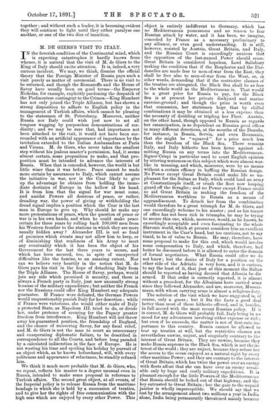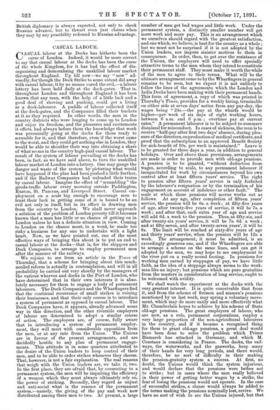M. DE GIERS'S VISIT TO ITALY.
IN the feverish condition of the Continental mind, which is expecting catastrophes it hardly knows from whence, it is natural that the visit of M. de Giers to the King of Italy should excite attention. It is, indeed, a very curious incident. We may, we think, dismiss the official theory that the Foreign Minister of Russia pays such a visit purely as matter of ceremonial. There is no visit to be returned, and though the Romanoffs and the House of Savoy have usually been on good terms—the Emperor Nicholas, for example, explicitly pardoning the despatch of the Piedmontese contingent to the Crimea—King Humbert has not only joined the Triple Alliance, but has shown a strong disposition to adhere to English policy in the management of Turkish affairs, which cannot be pleasing to the statesmen of St. Petersburg. Moreover, neither Russia nor Italy could wish just now to set all tongues wagging by purposeless demonstrations of cor- diality; and we may be sure that, had importance not been attached to the visit, it would not have been sur- rounded with an artificial appearance of importance by the invitation extended to the Italian Ambassadors at Paris and Vienna. M. de Giers, who never takes the smallest step without his jealous master's permission, had, it seems almost certain, some proposition to make, and that pro- position must be intended to advance the interests of Russia. When that is conceded, however, the world is but little wiser than it was before. Peace cannot be made more certain by assurances to Italy, which cannot assume the initiative in war, nor is the Czar likely to give up the advantage he obtains from holding the imme- diate destinies of Europe in the hollow of his hand. It is from him that the signal for war must come, and amidst Powers all desirous of peace, or rather, dreading war, the power of giving or withholding the dread signal implies a position which the Czar is the last man in Europe to give up. Why should he make any more protestations of peace, when the question of peace or war is in his own hands, and when he could make peace certain for three years by rolling back 100,000 men from his Western frontier to the stations in which they are more usually hidden away ? Alexander III. is not so fond of promises which events may not allow him to keep, or of diminishing that readiness of his Army to meet any eventuality which it has been the object of his Government for the last three years to secure, and which has been secured, too, in spite of unexpected difficulties like the famine, to an amazing extent. Nor can we believe very heartily in the notion that M. de Giers pays his visit in the hope of detaching Italy from the Triple Alliance. The House of Savoy, perhaps, would join any side which promised it security, and there is always a French party in Italy, just now unusually strong because of the military expenditure ; but neither the French nor the Russians could offer King Humbert any adequate guarantee. If France were defeated, the German Powers would unquestionably punish Italy for her desertion ; while if France were victorious, she would either make of Italy a protected State, as Napoleon III. tried to do, or divide her, under pretence of securing for the Papacy greater freedom from interference. King Humbert will not throw away his guaranteed position, the friendship of England, and the chance of recovering Savoy, for any fiscal relief, and M. de Giers is not the man to court an unnecessary and exasperating diplomatic failure, to be described in correspondence to all the Courts, and before long paraded by a calculated indiscretion in the face of Europe. He is not wasting his time and spoiling his holiday by pursuit of an object which, as he knows beforehand, will, with every politeness and appearance of reluctance, be steadily refused him.
We think it much more probable that M. de Giers, who, we repeat, reflects his master to a degree unusual even in Russia, intended to make some proposal in reference to Turkish affairs. The second great object, at all events, of the Imperial policy is to release Russia from the maritime bondage in which she is held by a succession of treaties, and to give her the rights of free communication with the high seas which are enjoyed by every other Power. This object is entirely indifferent to Germany, which has no Mediterranean possessions and no reason to fear Russian attack by water, and it has been, we imagine, conceded by France as a necessary preliminary to any alliance, or even good understanding. It is still, however, resisted by Austria, Great Britain, and Italy, and the Russian Court is exceedingly anxious that the opposition of the last-named Power should cease. Great Britain is considered hopeless, Lord Salisbury making the condition that if the Bosphorus and the Dar- danelles are made free to men-of-war from the East, they shall be free also to men-of-war from the West, or, in other words, demanding that if the restrictive clauses of the treaties are abrogated, the Black Sea shall be as free to the whole world as the Mediterranean is. That would be a great price for Russia to pay, for the Black Sea is at present her private dockyard and marine exercise-ground ; and though the prize is worth even that concession, her statesmen hope that by skilful combinations it may be obtained at a less expense than the necessity of doubling or tripling her Fleet. Austria, on the other hand, though opposed to Russia as regards her emancipation, is so dependent on Russian good offices in many different directions, at the mouths of the Danube, for instance, in Bosnia, Servia, and even Roumania, that she might be " squared" for a price much less than the freedom of the Black Sea. There remains Italy, and Italy hitherto has been fierce against ad- mitting Russia on any terms into the Mediterranean. Signor Crispi in particular used to court English opinion by uttering sentences on this subject which were almost war- like in meaning, and which, moreover, were by no means without a certain efficacy in baffling the Russian design. No Power except Great Britain could make life so un- pleasant for the Sultan as Italy, which could land an army at Constantinople itself, or crush the fleet now keeping guard off the Seraglio ; and no Power except France could so aid Great Britain in making the freedom of the Mediterranean worthless to Russia as a means of aggrandisement. To detach her from the combination would therefore be a great triumph for M. de Giers, and one exceedingly welcome to his master ; and as his tenure of office has not been rich in triumphs, he may be trying to secure this one, which, moreover, would, as he knows, be exceedingly acceptable and even fascinating to the whole Slavonic world, which at present considers him an excellent instrument in the Czar's hand, but too cautious, not to say timid, to be of value to Russia. He may, therefore, have some proposal to make for this end, which would involve some compensation to Italy, and which, therefore, had better be discussed before it is allowed to enter the domaia of formal negotiation. What Russia could offer we de not know ; but the desire of Italy for a position on the other side of the Adriatic is very keen, and it is curious, to say the least of it, that just at this moment the Sultan should be reported as having decreed that Albania be die armed. If that order is correctly reported, it is almost without a precedent, for the Albanians have carried arms since they followed Alexander, and are, moreover, Mussul- mans, with whom carrying arms is almost a religious duty. The solution of the visit which we have suggested is, of course, only a guess ; but it fits the facts a good deal better than most of those hitherto offered, and is, besides, in full accord with the most recent Russian policy. If it is correct, M. de Giers will probably fail, Italy being in no mood for any adventures involving either expense or risk; but even if he succeeds, the matter is not of first-rate im- portance to this country. Russia cannot be allowed to tear up treaties at will, but the restrictive clauses are nevertheless unwise, unjust, and singularly contrary to the interest of Great Britain. They are unwise, because they make Russia supreme in the Black Sea, which is not the in- terest of the world ; they are unjust, because they refuse her the access to the ocean enjoyed as a natural right by every other maritime Power ; and they are contrary to the interest of Great Britain, which has twice the power over an enemy with fleets afloat that she can have over an enemy assail- able only by huge and costly military expeditions. It is pleasant enough for the little Powers of the Mediterranean that Russia should be locked out of that highway, and the key entrusted to Great Britain ; but the gain to the unpaid janitor is wholly imperceptible. We should say that we lost by the arrangement about two millions a year in India alone, India being permanently threatened mainly because British diplomacy is always expected, not only to check Russian advance, but to thwart even just claims when they may by any possibility redound to Russian advantage.



































 Previous page
Previous page